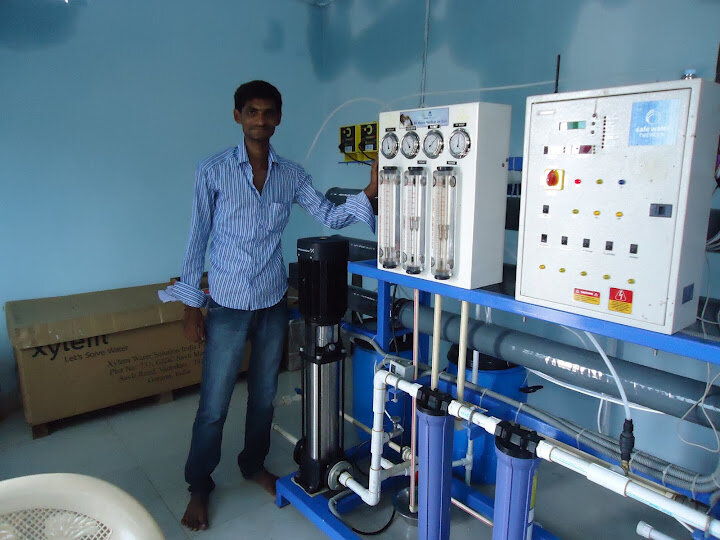Entrepreneur Teams Up with Community
“I wanted to help bring safe water to my home.”
 Chaitanya is an entrepreneur and the local operator at the Mahabubabad iJal Station, a joint venture with the town. Today, the iJal Station provides reliable and affordable safe water to over 20% of this peri-urban town of 25,000 people. Before its opening, many of the town’s population lacked affordable, safe water access. The local “free” sources were contaminated with heavy metals and the alternative private options were priced too high for the majority of the population, who earns $4 a day or less.
Chaitanya is an entrepreneur and the local operator at the Mahabubabad iJal Station, a joint venture with the town. Today, the iJal Station provides reliable and affordable safe water to over 20% of this peri-urban town of 25,000 people. Before its opening, many of the town’s population lacked affordable, safe water access. The local “free” sources were contaminated with heavy metals and the alternative private options were priced too high for the majority of the population, who earns $4 a day or less.
In 2011, the local committee chair of the community organization Sri Darma Shastra Praja Seva Samithi had heard about Safe Water Network’s work in other areas of Telangana and wanted to know how we could help their town.
The Samithi committee, comprised of village elders and leaders, oversaw several programs aimed at the welfare of the community, including food distribution. Affordable safe water access was high on their agenda because water-related diseases, such as fluorosis, caused by local untreated sources, posed significant community health and economic challenges.
The existing supply of water came from a private company catering to the more well-to-do. Their four distribution stations sold water at 15 rupees per 20L can—too expensive for many in Mahabubabad.
The Samithi committee recognized that Safe Water Network had an approach that priced water affordably at approximately 4 rupees per 20L.
Safe Water Network met with the committee to discuss the iJal program, detailing the pathway to local sustainability based on our experience in several regions of India where communities successfully oversee such systems. iJal, meaning “my water” in Hindi, is the brand of our water and includes a full training and operating kit to support the launch and ongoing management of the iJal Station.
With our help, the committee debated the merits of the enterprise, weighing the investment required for equipment, land, and structure, plus the cost of hiring someone to operate the station. Seeing great benefits in the community joining the governing body, as opposed to simply taking a passive role as recipients of a donor operation, the committee approved the project and made a financial contribution of 300,000 rupees (US$5,660) for the building and bore well.
Safe Water Network encouraged the committee to consider an additional investment in delivery vehicles based on a preliminary assessment of Mahabubabad’s dispersed population. We’d learned from our field experience in Ghana and India that convenience was a key driver to safe water adoption.
When a target of 75 percent household penetration is achieved in a community, the price of water can be set low enough to be affordable to the vast majority of villagers, while also generating enough revenue to cover operating costs and build a maintenance reserve. Delivery to outlying areas increases both household penetration and revenues. Before its opening, the area lacked affordable safe water access. The committee recognized this importance to safe water adoption, and another 70,000 rupees (US$1,320) was allocated for a down payment on two vehicles.
Once the community declared its commitment to the station, Safe Water Network provided the funds required for the reverse osmosis (RO) purification system (465,375 rupees/US$8,780) as a low-interest loan with an eight-year payback. We also provided the technical support, training, and the health and hygiene education materials necessary to build awareness and demand for safe water.
Real-Life Impact
Despite this investment by the community and Safe Water Network, it was still not enough to make the water station a reality. That’s where Chaitanya came in. With a mechanical background and a keen interest in running a business, he offered to donate land he owned in exchange for the rights to operate the village water station (valued at approximately 5 lacs/US$9,435).
His undeveloped parcel was used by cattle and as an unofficial village dump. It was also an open-field toilet because running water and bathrooms are mostly nonexistent and vacant land often ends up being used for open defecation.
Before the village could agree to these terms with Chaitanya, they needed to address the price of the water. Because safe water was already being sold in the village for 15 rupees per 20L can, it was important to the committee that the price was set low enough for most villagers to afford, but also sufficient for Chaitanya to cover operating costs and recover his capital. An agreement was made to address these concerns, and 10 months later the Mahabubabad Safe Water Station was launched. Today water is sold at the station for 4 rupees per 20L can and delivered to home for 10 rupees per 20L can.
The cleanup of Chaitanya’s land before construction inspired those living near the station to do the same with their land. Today the impact of the station has transformed this part of the village, and the neighborhood is a healthy place to congregate and buy safe water.